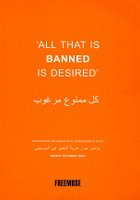 Music censorship has become a topic of increasing interest in recent years, thanks partly to the efforts of the Danish charity Freemuse. Founded in 1998, Freemuse is the only global organisation that advocates freedom of expression for musicians and composers.
Music censorship has become a topic of increasing interest in recent years, thanks partly to the efforts of the Danish charity Freemuse. Founded in 1998, Freemuse is the only global organisation that advocates freedom of expression for musicians and composers.Freemuse's latest report, "All that is Banned is Desired", highlights some of the main issues of music censorship in the Middle East. The issues range from religious opinions on musical performance to curbs on heavy metal music in certain Arab countries, and the debate over Lebanese music videos featuring scantily clad women. Not all censorship is imposed by censors; self-censorship is widespread.
The report, prepared by British writer and journalist Trevor Mostyn, is based on the two-day conference that Copenhagen-based Freemuse held in Beirut last October in collaboration with the Heinrich Boll Foundation and the Irab-Arabic Association for Music.
In her opening speech to the conference, Freemuse's executive director Marie Korpe explained that the event was a result of, and a continuation of, the 2nd World Conference on Music and Censorship held in Copenhagen in September 2002. At that conference the famous Lebanese musician and composer Marcel Khalife had proposed that Freemuse arrange a similar conference in Lebanon.
Participants in the conference came from 14 countries, and there were testimonies from musicians, concert organisers and media professionals who had been censored in Iran, Pakistan, Lebanon, Syria, Bahrain and Morocco.
The conference offered much scope for lively anecdotes and cross-cultural comparisons. For example, the musician and associate professor Mark LeVine said that the young Iraqi firebrand preacher Muqtada al-Sadr fulfils many of the same functions - positive and negative - for his followers as young American rappers like NWA (Niggaz With Attitude) and Public Enemy fulfilled for their fans when they started out.
Mai Ghoussoub, the Lebanese founder of Saqi Books in London pointed out in her keynote speech that although censorship persists, it is becoming "almost impossible in the age of the internet, mass tourism and cheap flights to really suppress a book, a song or an image."
Bahraini singer Khalid Al-Shaikh, who has had some of his songs banned in Bahrain, said the best music is often produced in times of oppression. He noted the irony that although most of the singers and investors in entertainment in the Gulf are Saudi, Saudi Arabia has the strictest censorship.
Iranian singer Mahsa Vahdat described the ways in which since the 1979 Iranian revolution jurists have limited the freedom of music. Women in Iran can play musical instruments, but they may not sing to audiences that include men.
Several films were screened during the conference, including the documentary "The Rock Star and the Mullahs" featuring Pakistani guitarist Salman Ahmad of the Pakistani band Junoon. There was also the Middle East premiere of Syrian filmmaker Mohamad Malas’s film “Passion”, in which a woman is terribly punished for her innocent love of song.
Susannah Tarbush
